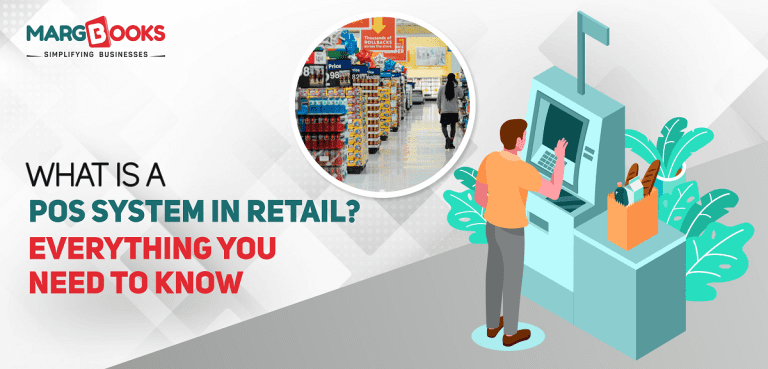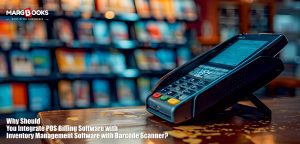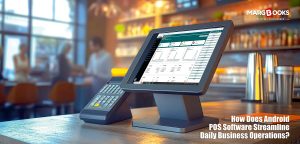In today’s fast-paced retail environment, businesses need efficient tools to manage sales, track inventory, and streamline operations. A POS system, or Point of Sale system, is an essential technology that helps retailers conduct transactions and manage their business effectively. But what exactly is a POS system, and why is it crucial for retailers? Let’s dive deep into everything you need to know.
What Is a POS System?
A POS system is a combination of hardware and software that enables businesses to process sales transactions. It acts as a digital cash register that not only records sales but also integrates with billing software and accounting software to automate business operations.
In simple terms, a POS system is where customers make payments for their purchases, whether at a physical retail store or an online platform. Modern POS systems come with features like inventory management, reporting, and customer relationship management, making them indispensable for businesses of all sizes.
How Does a POS System Work?
A POS system typically follows these steps:
- Product Scanning: The cashier scans the product’s barcode or manually enters product details.
- Billing & Payment Processing: The POS software calculates the total amount, including discounts and taxes. Customers pay via cash, credit/debit card, UPI, or digital wallets.
- Invoice Generation: Once the payment is successful, a receipt is generated digitally or in print.
- Stock Update: The inventory is automatically updated to reflect the sale.
- Sales Reporting: The POS system records the transaction details, which can be accessed later for accounting and analytics.
Why Is a POS System Important in Retail?
A robust POS system offers several benefits that help retailers manage their business more efficiently:
1. Faster and Efficient Billing
Traditional billing methods are time-consuming. With a POS system, retailers can process transactions quickly, reducing customer wait time and improving service.
2. Accurate Inventory Management
Modern POS systems track inventory in real-time, helping retailers maintain optimal stock levels and avoid overstocking or stockouts.
3. Seamless Integration with Billing & Accounting Software
A POS system integrates with billing software to automate invoicing and GST calculations. It also connects with accounting software to generate financial reports, reducing manual errors.
4. Enhanced Customer Experience
With features like customer loyalty programs, discounts, and digital receipts, a POS system helps retailers offer a personalized shopping experience.
5. Data-Driven Business Decisions
Retailers can generate detailed sales reports and analyse customer buying patterns to make informed business decisions.
Key Features to Look for in a Retail POS System
When choosing a POS system, ensure it has the following features:
- User-Friendly Interface: Easy to use for both employees and customers.
- Cloud-Based Access: Access data from anywhere, anytime.
- Multi-Payment Support: Accepts cash, cards, UPI, and mobile wallets.
- GST Billing & Compliance: Automates tax calculations and generates GST invoices.
- Inventory Management: Tracks stock levels and alerts for restocking.
- Customer Relationship Management (CRM): Stores customer data and purchase history.
- Sales & Financial Reporting: Provides insights to track business performance.
- Security & Data Backup: Ensures data protection against loss or theft.
Margbooks – A Trusted POS Solution for Retailers
If you are looking for a reliable POS system that integrates seamlessly with billing software and accounting software, Margbooks is a great option.
Why Choose Margbooks?
- Cloud-Based POS System: Access your data securely from anywhere.
- GST-Enabled Billing Software: Ensures compliance with tax regulations.
- Advanced Accounting Software: Automates bookkeeping and financial reporting.
- Inventory & Stock Management: Keeps track of stock levels in real-time.
- Multi-Payment Support: Accepts multiple payment modes for seamless transactions.
- User-Friendly Interface: Easy to use for retailers and staff.
With Margbooks, retailers can streamline their operations and enhance efficiency, leading to increased profitability.
How to Choose the Best POS System for Your Retail Business?
When selecting a POS system, consider the following factors:
- Business Needs: Identify the features that are most relevant to your business.
- Scalability: Choose a system that can grow with your business.
- Integration Capabilities: Ensure it integrates with billing software and accounting software.
- Customer Support: Look for a provider that offers reliable customer support.
- Cost & Pricing Plans: Compare pricing and choose a system that fits your budget.
Conclusion
A POS system is an essential tool for retailers, helping them manage sales, inventory, and finances efficiently. With the right billing software and accounting software integration, a POS system can significantly enhance business operations. Margbooks is a trusted solution that offers seamless integration, making it an excellent choice for retailers looking for a feature-rich and reliable POS system.
Investing in the right POS system can simplify your business operations and help you stay ahead in the competitive retail market. So, choose wisely and take your retail business to the next level




